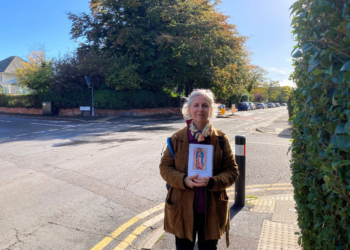Sir Bernard Jenkin MP was Shadow Defence Secretary 2001-03.
“You may not be interested in war, but war is interested in you,” wrote Leon Trotsky. Ukraine dominates the news – but the crisis for European security is wider than just Ukraine.
European security has depended on Nato for the past 80 years. Now Donald Trump has left a question mark over his commitment to Article V of the NATO Treaty (the mutual defence clause). This is a crisis for the alliance: if there is a ceasefire in Ukraine, where will Vladimir Putin turn his attention next?
Anyone wanting to understand the Russian mentality listen to Russian spokesmen like Sergey Markov. On BBC Radio 4 last week (listen from 2:14:45), he denounced the Ukrainian government as an “illegal regime” and that it was implementing a process of “Nazification of Ukraine”. He wants Ukraine to be puppet state like Belarus.
Putin deeply resents that former Soviet states, like the Baltic States, are today independent and sovereign members of NATO, and that countries like Finland and Poland are now free from Russian domination. He wants nothing less than to roll back the frontiers of democracy in Eastern Europe, reimposing a new Iron Curtain.
As such, any kind of “ceasefire” in Ukraine is not the same as peace. The best we can expect is some kind of frozen conflict, but worse is likely.
Lenin advised that: “You probe with bayonets: if you find mush, you push. If you find steel, you withdraw”. Like Lenin, Putin only respects force. Russia continues to build up 1.5 million men under arms, and is likely to move on to menace NATO members like Lithuania, Estonia, Latvia, or non-NATO states like Moldova.
Without explicit and reliable support from the United States, we Europeans must be ready stand alone against the threat of tyranny and military aggression, but it will take years or even decade to replicate US military capability in Europe.
This does not just mean announcing bit more spending on defence, and the rest of us carrying on life as normal. The UK and Europe must mobilise modern, agile, armed forces to be able to sustain a protracted was against the Russian military.
If we want to have a chance of deterring Russia from continuing military aggression, our populations must be also mobilised. We must have armed forces ready to fight the Russian army, and populations who will back that action. Otherwise Putin will continue to exploit our weakness; continuing attempts to avoid being ready for direct conflict with Russia just plays into the Kremlin’s hands.
What has been striking about the Ukrainian response to the Russian invasion is how the whole of Ukrainian society has been mobilised. Much of the most innovative and effective weaponry (drones, cyber capability, electronic counter-measures) has been developed by private individuals and companies working autonomously, without government contracts but being paid for what they can produce.
These days, it is nations who fight wars, not just the armies. This must involve everyone – civil society, industry, academia, as well as government and the armed forces.
It took from around 1936 to 1940 before Britain was fully mobilised for WW2. Today, the UK’s strategic defence review must map out a path to mobilise the British people to be ready to face what we are already confronted with, including but not limited to: Russian sabotage of under-sea infrastructure, poisoning their enemies on British streets, launching cyber attacks on NHS hospitals, and the extortion inflicted on the whole of Europe by using Russia’s use of gas exports as an economic weapon.
These – along with trade, grain supplies out of Ukraine, propaganda, and subversion – are all the weapons of what is known as hybrid warfare. We are all involved. We are all paying for the consequences.
What more can we do? There is a strong case for some form of national service, so far more people are trained and ready for a real shooting war. Not because we want a war, but because that is the only way to be sure of preventing one.
At least we must be bold and resolute, ready to make sacrifices. The trimming of welfare budgets is a very small part of what is required. We can’t raise taxes or borrow more. ublic spending and taxes are at a record high.
A small part of the massive British state must be diverted to defence and security. If not, we are still pretending there is peace. Is there any realistic alternative?
We must continue to try to keep the US in NATO and committed to European defence. The UK must not be drawn back into European Union foreign policy and defence structures, duplicating NATO structures whilst excluding non-EU members of the alliance and reinforcing the decoupling of the US from european security. This is a distraction from the urgent task of just getting on with expanding military capacity.
We must hope that President Trump will begin to see that a breakdown of security on the edges of NATO would, in the end, draw the US into another global conflict – which is why America has, until now, supported the without question.





![Trump's Admin Guts Another ‘Rogue Government Agency with Zero Accountability’ [WATCH]](https://www.right2024.com/wp-content/uploads/2025/03/Trumps-Admin-Guts-Another-‘Rogue-Government-Agency-with-Zero-Accountability-350x250.jpg)



![‘We All Owe Him (Elon) a Huge Debt of Gratitude’ [WATCH]](https://www.right2024.com/wp-content/uploads/2025/03/‘We-All-Owe-Him-Elon-a-Huge-Debt-of-Gratitude-350x250.jpg)
![NCAA Champ Salutes President Trump After ‘BIGGEST UPSET IN COLLEGE WRESTLING HISTORY’ [WATCH]](https://www.right2024.com/wp-content/uploads/2025/03/NCAA-Champ-Salutes-President-Trump-After-‘BIGGEST-UPSET-IN-COLLEGE-350x250.jpg)






